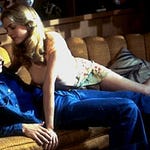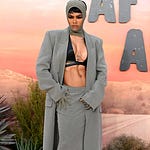Rob joins me to discuss the first three episodes of Vince Gilligan’s Pluribus, which is now on Apple TV.
I started watching because I trust Gilligan based on Breaking Bad and Better Call Saul both being among my favorite shows. The fact that he brings Rhea Seehorn along as the lead actress added to the appeal.
If you haven’t watched it yet, you can go ahead and start now since we’ll be following along with the series (spoilers below). One cool thing Gilligan does is that he spends a lot of time showing people getting deeply into some technical or scientific topic or engaging in a form of craftsmanship. We see a great deal of lawyering in Better Call Saul, and engineering and chemistry in Breaking Bad. Recall Walter White’s experiences fixing the boiler and cooking meth, or Gus talking wine. We observe glimmers of this here when the scientists find signs of alien life, and when Carol and Helen are walking through the ice hotel and the bellhop is explaining the experience. Rob informs me that this is something the kids call “competence porn,” a phrase that we both hate but nonetheless seems to capture the phenomenon.
Gilligan has identified as conservative, or at least more conservative than most people in Hollywood. I discuss with Rob the beauty of casting a Mauritanian as the lecherous guy who uses his newfound power to ride on Air Force One and have sex with as many women as possible. This is a country with a blend of French, Arab, and black African culture. In other words, this is like the sexual predator singularity (I can say it, I’m an Arab). Moreover, the Asians and Native Americans want to just accept the new world, the black guy wants to be king and have a lot of sex, and the upper class American white woman is the only one looking around and saying this is not ok! Perhaps she needed to be a lesbian, as that’s the only way a show can otherwise be this politically incorrect. The other benefit of making her one is that she stands out as a prototypical suburban Karen. Rob points out that even her name sounds like Karen.
I also see hints of a parable that is pro-capitalist, or at least somehow about capitalism. When Carol finds Sprouts empty, she calls the aliens and tells them that she’s always been independent and wants to do her own shopping. But to get her “independence” she needs an army of drones to bring the food and stock the shelves. Isn’t this what capitalism is? People mindlessly doing repetitive tasks for our pleasure and benefit? We just don’t appreciate it and think that we created everything we have. Then at the end of episode 3, we get Carol’s shock upon realizing they would provide her with an atom bomb if she wanted one. Is this showing us where capitalism goes off the rails, when it gives us substances and products that are clearly harmful?
Rob brings up AI as a theme, which I didn’t consider much before, but it makes perfect sense. Here is this thing that has access to all of the world’s knowledge, is much smarter than you, but also has blind spots and is dumb in a lot of ways.
We spend a lot of time going over potential paradoxes regarding the rules of how the pod people behave and interact with the autonomous humans remaining. What if they get contradictory commands? Do they feel pain and pleasure experienced by other pod people? Why can they not coerce the remaining humans into doing stuff while their entire project is about coercion in the end? Where do animals fit into all this? There’s a lot in this universe that is yet to be explored.
On the surface, we’re supposed to be on Carol’s side. But part of me wonders whether there’s a pro-alien reading of the show. Maybe they really are all-knowing and we should just listen to them. When Zosia serenely tells Carol, in her drugged up and miserable state, that we would all save a person drowning without thinking twice, doesn’t the point land? After all, Zosia is happy and Carol is spiraling! You might say she was in this condition because of the aliens, but the flashback to the hotel and initial episode tell us she wasn’t all that happy before.
Rhea Seehorn is perfectly cast here. As a dry-humored cynic, she seems more Wexler than Wexler. Maybe this is another reason she had to be a lesbian. I feel that if a woman like Carol wasn’t a lesbian, her male partner would need to be a complete non-entity.
The show is generally funny, though the snapback humor is a bit cringe. I think Seehorn provides the best possible version of it nonetheless.
Gilligan has not disappointed, and I’m eager to see where this goes next.
If you are interested, check out previous discussions I’ve had on Breaking Bad and Better Call Saul. All conversations are with Chris Nicholson, except for the two that involved Marc Andreessen. Pretty amazing to think that at this point I have done dozens of hours of video and audio on the worlds that Vince Gilligan has created. My audience for the TV reviews isn’t huge, but it is very passionate.
Rewatching Breaking Bad, S1 and S2
Rewatching Breaking Bad, S3- S4E4
Rewatching Breaking Bad, S4-S5
Better Call Saul: S6E7, Plan and Execution
Better Call Saul: S6E8, Point and Shoot
Better Call Saul: S6E9, Fun and Games
Better Call Saul: S6E10, Nippy
Better Call Saul: S6E11, Breaking Bad
Better Call Saul: S6E12, Waterworks
Nietzschean or Christian? Marc Andreessen on Breaking Bad and Saul











